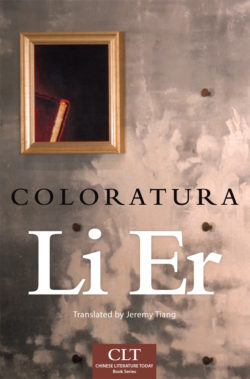July 2019: Li Er 李洱
 Novelist and short story writer Li Er was born 1966 in Henan Province. Despite his modest claim to be a "not very prolific" author, he has published five story collections, two novels and approximately 50 novellas and short stories. His work appears regularly in a variety of Chinese mainland literary journals. Although Li Er is still relatively unknown outside of China, he is widely respected in Chinese literary circles and has acquired a passionate fan base of readers. He has also attracted a great deal of attention among literary critics and academics for his stylistically innovative prose. Li Er's second novel, Cherry on a Pomegranate Tree has been translated into German. His debut novel Coloratura, which explores the fate of the individual in contemporary China and the problematic quest for "historical truth", has been translated into English by Jeremy Tiang, and is published as part of the Oklahoma University Press "Chinese Literature Today" series.
Novelist and short story writer Li Er was born 1966 in Henan Province. Despite his modest claim to be a "not very prolific" author, he has published five story collections, two novels and approximately 50 novellas and short stories. His work appears regularly in a variety of Chinese mainland literary journals. Although Li Er is still relatively unknown outside of China, he is widely respected in Chinese literary circles and has acquired a passionate fan base of readers. He has also attracted a great deal of attention among literary critics and academics for his stylistically innovative prose. Li Er's second novel, Cherry on a Pomegranate Tree has been translated into German. His debut novel Coloratura, which explores the fate of the individual in contemporary China and the problematic quest for "historical truth", has been translated into English by Jeremy Tiang, and is published as part of the Oklahoma University Press "Chinese Literature Today" series.
Bio from Paper Republic
We're delighted to feature Li Er as our author of the month this July, with the story 'Where Are You?', translated by Joshua Dyer and first published in English in the summer 2015 issue of Pathlight magazine. You can read the original Chinese (first published in 2009) here, and the translation here.
We were also lucky to be joined by two other of Li Er's translators, Jeremy Tiang and Dave Haysom, for a special event on recently published fiction and poetry from China. And we're looking forward to reading Coloratura, published by Oklahoma University Press.
 Set against the turbulent backdrop of the Chinese Civil War, Coloratura revolves around the mysterious Ge Ren, whose story is told by three narrators and a host of other voices. Who was Ge Ren really? Just about the only thing anyone can agree on is that he is dead. But how he died, and who he was when alive, are less than certain. Was Ge Ren a hero, a Nationalist or Communist, a poet, translator, scholar, or spy—or some combination of all these identities? And how much of his story is merely fanciful “coloratura” nonsense?
Set against the turbulent backdrop of the Chinese Civil War, Coloratura revolves around the mysterious Ge Ren, whose story is told by three narrators and a host of other voices. Who was Ge Ren really? Just about the only thing anyone can agree on is that he is dead. But how he died, and who he was when alive, are less than certain. Was Ge Ren a hero, a Nationalist or Communist, a poet, translator, scholar, or spy—or some combination of all these identities? And how much of his story is merely fanciful “coloratura” nonsense?
As different factions fight for control of China, Ge Ren traverses the political and intellectual life of the country, managing to affect countless lives. Years later, in the present day, his final surviving descendant, the intriguing “compiler” of the novel, pieces together the stories of her enigmatic ancestor from a patchwork of narrators, reliable or otherwise, and historical documents, real or invented. But readers also will wonder if she has an agenda of her own.
The search for Ge Ren takes us from Chairman Mao’s stronghold at Yan’an to a barren People’s Commune, and then farther afield, with excursions into Russia, Japan, and even a small town in England. Many of the characters and incidents are actual historical figures and events, woven seamlessly into the fictional storyline. Told with swashbuckling brio and painstaking historical detail, Coloratura is both an illuminating journey through twentieth-century Chinese history and a profound exploration of the elusive nature of truth.
Li Er gave an interesting speech on 'The Future of the Novel' at the Edinburgh World Writers' Conference in 2012-13. You can watch a video of the speech here, and read an edited version, translated by Alice Xin Liu and available here.
